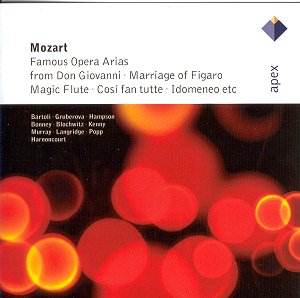It could be entitled Highlights of Highlights: but
that would probably make it sound like a Hairdressers conference. However,
highlights are what this CD comprises. Instead of either the highlights
of an opera with most arias and no recitative: or a particular soloist’s
recording of Mozart’s arias from several operas, here we have different
soloists for different arias from different operas. What is that but
Highlights of Highlights? I rest my case.
The only exception to the one aria one soloist rule
is Edita Gruberova. Her first aria is Or sai chi l’onore Donna
Anna’s plea to Ottavio to avenge the murder of her father. This is a
sharp–toned Donna Anna with an edginess which does not sound like the
daughter of the Commendatore. She sounded slightly shrill. That is sad
because it starts the CD on almost an off beat.
Thus because there is no apparent reason that I can
discover for the order of the operas, let us leap ahead to the eighth
track and the second from The Magic Flute. This is Gruberova’s second
aria and joy of joys it is Der Hölle Rache kocht in meinem Herzen.
And there is nobody who sings this better. This is an evil Queen hell
bent on vengeance where the edgy timbre is ideal. Her hitting of the
high notes leaves us breathless – but not Gruberova. I accept that there
are other recordings pushing her hard: particularly Rita Streich (on
the DG Fricsay recording 435 741 – 2); but as excellent as that is it
is just does not quite match this Night Queen’s spell.
Now let us return to Don Giovanni himself and Thomas
Hampson. ‘Come to your window’ he sings. This wonderfully smooth honey-toned
Hampson would have ladies leaping out of windows. Glorious. Then to
Zerlina, comforting her affianced for the beating from the Don. Here
is a gentle loving caring sound; with breathiness of excitement at his
hand on her heart. And splendidly complemented by the thin strings which
seem to empathise with Zerlina.
We move onto a real Figaro in Anton Scharinger, so
evidently glorying in the despatch of Cherubino into the military life
and relishing the discomforts he will suffer. The orchestra allows us
to hear every word of the expression filled performance. So ends Act
I and Act II starts with the next track and the Countess and Porgi
amor sung by Charlotte Margiono. The thin strings here do not help
to bring out the wistful sadness. Whilst there are some excellently
clear high soft notes there is little feeling of the wished for return
of love. What is that love, ponders Cherubino (Petra Lang) in the famous
Voi che sapete. Whilst perhaps not sounding like the youngest
of Cherubinos, here is real doubt and wistful sound wrapped in questioning
tones.
We return to The Magic Flute and Tamino’s portrait
perusal: here are ringingly clear words with good firm rounded tones.
A single aria from Cosi accorded to van der Walt as Ferrando: again
a clear tone with vocal expression. But could I hear him drawing breath?
I fear so.
Onto Martern aller Arten, Konstanza’s declaration
of steadfastness. This is Yvonne Kenny going from ringing resolve to
moving plea for pity. There are some superb high notes delivered piano
and some stunning coloratura.
Idomeneo utters defiance in Fuor del mar having
escaped the sea’s storm to meet an emotional one. Werner Hollweg does
not appear to be too miserable in the middle section: more gently questioning
and in the last section emotional nuance and contrast are apparent rather
than rage. Here is an Idomeneo with outstanding breath control and a
firmness of run who causes us to think again about the aria.
We conclude with three arias from one of Mozart’s last
operas and finally with one aria from one of his first operas. Ann Murray
expresses the plea for love / qualms of conscience of Sextus with great
beauty of tone. There is one particularly chest delivered vorrai
that will have you running the track back to hear it again immediately.
Her occasional forte is not so successful. Overall this is a gently
piano submissive Sextus. Titus himself would sooner reign with love
than severity. Philip Langridge makes us believe just that with splendid
contrasts, breath control and runs.
The last two arias are reserved for Lucia Popp and
Cecilia Bartoli. Popp sings Vitellia’s unhappy aria with a wonderful
display of vocal register and range, faultless breath control, tones
of contrast and expression second to none. Which leads neatly into the
last aria from an early opera but giving Bartoli the opportunity to
display once more the rich creamy tone of smooth sound.
For that is what this CD is: an extract of previous
recordings of opportunities for eminent soloists to display their every
musical skill. It is a pity there is not a word of libretto in sight:
nor a rationale for some of the choices. The accompanying ‘booklet’
is a double page sheet of general observations on various aspects of
Mozart’s music – but with no discernible reference to the CD
Never mind. I will take Lucia Popp and Edita Gruberova’s
Queen of the Night to my desert island to found my collection.
Robert McKechnie



![]() Royal Concertgebouw Orchestra
(1-6,9)
Royal Concertgebouw Orchestra
(1-6,9) ![]() WARNER CLASSICS APEX
0927 413762 [76.54] Bargain Price
WARNER CLASSICS APEX
0927 413762 [76.54] Bargain Price